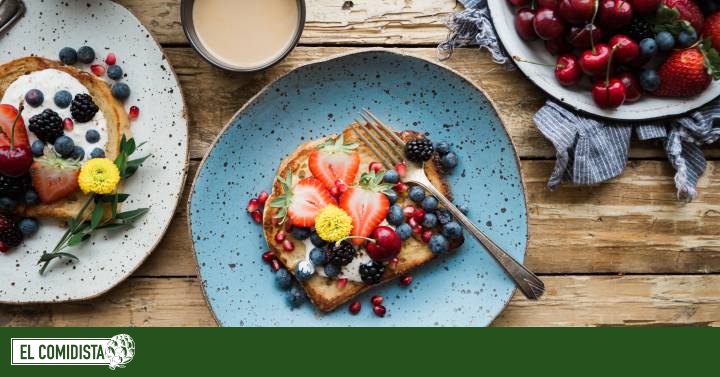"Eat breakfast like a king, eat like a prince and dine like a beggar."
Following unqualified folk wisdom, you wake up at 6 a.m. for KitKat pizza for breakfast, and frolic in the sun while eating pink panthers always before 5 p.m.
In a social model in which everything revolves around a normative weight and being outside of those canons is labeled as failure, it is tempting to think that simply by altering the time of meals we can lose weight.
We also cling to the idea that taking certain foods or nutrients after an hour can make us fat, or that there are meals that we should not skip because that will condemn us to Dante's hell.
So you sacrifice yourself and every day you have your
croissant
with butter and your sugary cocoa for
breakfast
, but you never eat fruit for dessert at dinner: everything is controlled.
Although the saying is part of popular knowledge, research on how the timing of meals affects our health is recent.
At the moment, the data we have is scarce, although preliminary results suggest that it may have a basis.
Of course, do not expect miracles.
Can we control our weight by looking at the clock?
We have already overcome the idea that to maintain weight it is enough to “eat what we spend”, basically because we have no way of monitoring “what we spend” (added to the difficulties to freely choose what we eat, but that is another garden) . The energy balance is extremely complex and there are many variables that condition it, most of them uncontrollable as my comedian
colleague
Juan Revenga
tells you
.
For some years now, the idea that the timing of meals is one of all these factors has been taking shape. The latest position paper on the treatment of overweight and obesity from the American Academy of Nutrition and Dietetics, from 2016, already contemplates that the time of day when food is eaten can be important for weight control, and that “ potentially, consuming more energy at the beginning of the day rather than at the last minute, can help with weight management (...) due to the influence of diet on the circadian rhythm ”. It is promising, but it also indicates that the evidence is "very limited."
Since the publication of that document there have been new investigations and they point in the same direction, but they are not conclusive either. One population group with whom this alteration of the circadian rhythm and its effect on weight can be studied are shift workers. In
Chronobesity: Role of the circadian system in the obesity epidemic
It is indicated that several epidemiological studies have found that people who have this type of schedule suffer a greater risk of obesity than their colleagues who work during the day, something that is also included in this study collected in Pubmed. This systematic review also points out that this occurs despite the fact that there are no differences in their energy intake. On the contrary, it does indicate that there may be differences in the timing of meals, the type of foods chosen and the distribution of energy throughout the day, which can contribute to the risk of disease.
In people who sleep little, there is also an alteration of the circadian rhythm, which can further expose them to obesity.
In addition, in these cases it is seen that the energy intake is greater throughout the day.
In this study on the influence of sleep health we see that when our internal clocks are in "sleep mode" we have low glucose tolerance and gastric emptying is slower, so consuming food at that time produces alterations such as resistance to insulin or increased blood pressure which, in the long run, may be responsible for weight gains, risk of type 2 diabetes or cardiovascular disease.
You don't have to get sick of eating right before bed.
PIXNIO
Owl or lark?
If you have a hard time getting out of bed and until the third coffee in the morning you cannot consider yourself a human being, you are not lazy. Nor are you a sinsorgo ruddle if the opposite happens to you, and at eight in the afternoon you just want to roll on the couch and let the world forget you. You can blame your circadian typology or chronotype, that is, the time your body prefers to be active or to rest throughout the day. Your chronotype is not going to free you from the rapapoor for being late to work, or from the disappointed face of your friends for suggesting to change the post-restriction-pandemic night drinks for an afternoon coffee, but at least you will have science on your part which is a good argument.
As you can read in this scientific publication
, it
is considered that there are three different chronotypes: the morning, the afternoon and the intermediate.
If you are curious to know which one you belong to - and external signals in the form of social disapproval have not given you clues -
this questionnaire
can give you the answer.
The chronotype, that preference to fit activity and rest at certain times, is the most visible sign of something that happens at the biological level: the circadian rhythm.
In
Chronobesity: Role of the circadian system in the obesity epidemic
It explains how we are all exposed to 24-hour cycles, and our body adapts to environmental changes and uses stimuli such as light or temperature to synchronize with the environment. The circadian rhythm consists of regulating metabolic and physiological processes in order to better respond to energy demands, which vary throughout the day. To achieve this we have a group of neurons that form the suprachiasmatic nucleus (SCN), a true internal clock in the hypothalamus, which functions as the command center for our schedules. It is the boss, the central clock that responds primarily to light and dark stimuli and coordinates sleep-wake cycles, temperature regulation, hormonal secretion, metabolism and eating behavior.
But, in addition, we have other r "peripheral elojes" distributed throughout the body to adjust the physiological functions in each tissue to that circadian rhythm, following the orders that come from the central clock. In addition, its functioning also responds to external stimuli. Guess which one is the main one? Exactly. Food. (1,2).
In certain circumstances we can lose this synchronization between external signals and physiological processes or between the central clock and peripheral clocks and what the scientific literature has described as "chronodisruption" occurs. This is what happens to us when we travel across various time zones or when we work shifts. But there is evidence that it also happens when meal times are irregular, precisely because food is a regulator of our peripheral clocks: while the central clock is aligned with the day-night cycle, the peripheral clocks of the liver, pancreas or tissue fat go to their roll, synchronized with the arrival of food.
Our days can be a real chaos and work-life balance is a utopia that workers no longer consider, so many times choosing lunch time is a fantasy: eat when you can, where you can and continue producing.
By removing this 'little detail', our chronotype also influences our preferences in meal times.
In
The association between chronotype and dietary pattern among adults: A scoping review
and in this other study from the end of 2019, it is indicated that people with later meal times correspond to an evening chronotype.
Always have breakfast, little dinner ... what to eat and when to eat it
Our circadian rhythm seems to be in constant struggle with work and social schedules.
For the "morning", eating at three in the afternoon and being in the office until 19 is an unbearable punishment.
The "evenings" do not have it better entering to work at eight, and regardless of the chronotype, the workday almost pushes us to leave the house running with little more than a coffee in the body and arrive at dinner wanting to devour whatever gets ahead of us, and it becomes the highest energy intake of the day.
Do we have to change habits?
Let's collect.
Hours of main meals: it seems that to protect our health and our weight the balance is tipped to avoid eating and dining late.
This is reflected in several scientific reviews that have compiled the studies on the subject (1, 2, 3).
How we distribute the energy intake throughout the day, that is, which food has to provide us with the most kilocalories: the scientific findings are contradictory. Some reviews like
Are large dinners associated with excess weight, and does eating a smaller dinner achieve greater weight loss? A systematic review and meta-analysis
found no direct relationship between high energy intake late in the day and the risk of obesity, while others consider it an important factor.
Essential breakfast, yes or no?
As a loyal reader of El Comidista, you know this one.
No. The "breakfast" as we popularly conceive it, that is, that meal that is made first thing in the morning with the legañas stuck, is not essential.
Nutritionists sometimes don't eat breakfast 😉.
What studies on meal times and health do attach importance to is the composition of breakfast.
It is no surprise that chocolate breakfast cereals are always going to have a worse impact on our health than plain yogurt with nuts, we eat it at the time we eat it.
Focus on what you choose to eat, and forget whether the first meal of the day is at seven or at 13.
This toast with strawberries, avocado, pure cocoa and hazelnuts can be a good first meal.
MÒNICA ESCUDERO
Carbohydrates and fruit at dinner, are they forbidden? No. There is little evidence that simultaneously studies the circadian rhythm and nutrients, but when it is done, as in this study from
2016
or this one from 2015, it points to the opposite: it seems that it is preferable to consume carbohydrates with dinner . But beware, when we talk about carbohydrates we are not referring to pizza, chips and soft drinks, but to fruits, vegetables, legumes or whole grains, so do not rush to order a four cheese for dinner, we know each other.
Still far from being able to make firm recommendations, it seems that adapting our meals to times that are more aligned with circadian rhythms can have a positive impact on our health and weight. Although in our country, where heating the chair in the office until eight o'clock in the afternoon counts positively,
prime time
starts at 11 o'clock at night and closing the discos at three o'clock in the morning in a pandemic is an attack on freedom, it doesn't seem very plausible.







